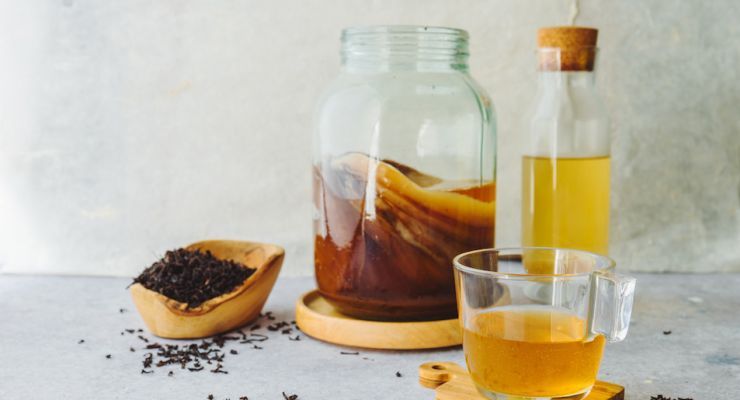In recent years, a very ancient drink has caught the eye of the masses. Unless you’ve been living under a rock, you’ve undoubtedly heard of kombucha, and it’s purported miraculous health benefits. But is it actually all it’s cracked up to be, or is it merely a yummy (potentially alcoholic) drink? Read on as we delve into the truth behind this fizzy beverage.
It’s no secret that real food and certain drinks possess potent health benefits that rival those of pharmaceutical medication. Turmeric is just as potent as chemical-laden over-the-counter pain meds, while green tea can decrease your risk of cancer by clearing toxins from your body. Supporters of kombucha believe that it has a similar level of usefulness,
What is kombucha?
Kombucha is a fizzy, carbonated drink that most likely originated in China around 2,000 years ago. It was once considered a luxury because sugar and tea (which are the primary ingredients in kombucha) were difficult to find and reserved for the upper classes. This drink is made through a fermentation process involving sugar, yeast, green or black tea, and bacteria. During fermentation, a colony of living bacteria and yeast called the SCOBY (or “the mother”) is added to the sweetened tea and allowed to ferment for a few weeks.
The final product that you buy on the shelves is the slightly tart, lightly sweetened result of this fermentation process with the SCOBY removed.
What can it do?
If you were to ask an ardent believer in the benefits of kombucha, they would likely respond with, “what can’t it do?” According to anecdotal evidence and long-held beliefs, kombucha can improve digestion, reverse diabetes, detoxify, strengthen the immune system, reduce blood pressure, fight rheumatism, gout, hemorrhoids, improve liver function, and fight cancer.
Unfortunately, these claims are a little overblown, and the truth, though still impressive, is significantly more modest. The real benefit of kombucha comes from its diverse bacterial profile. In case you weren’t already aware, your gut is filled with at least 500 different species of bacteria. Many of these are “good bacteria” working to improve gut ailments and maintain a critical balance of good and bad bacteria.
Kombucha is a probiotic food, just like yogurt, kefir, and kimchi, and provides a wealth of lactic acid bacteria to help maintain the health of your gut microbiome. The benefits of probiotics include improving the symptoms of irritable bowel syndrome and other gastrointestinal conditions, reducing the side effects of antibiotics, and treating yeast infections.
Plus, the black or green tea itself is loaded with antioxidants that have been definitively linked to cancer risk reduction and a lowered incidence of dangerous blood clots.
The alcohol content
It is important to address the alcohol-related concerns of this fermented beverage. To make it clear, yes, kombucha does contain minimal levels of ethanol. Since it is sold on the shelves without any restrictions, it is clear that kombucha falls below the federal 0.5 percent alcohol by volume threshold. This means that it is not considered an alcoholic drink by the FDA. Of course, you can purchase “hard kombucha” that has been fermented longer and with more sugar to increase the alcohol content. Keep these considerations in mind before you drink kombucha and avoid it if you are pregnant, have liver disease or pancreatitis, or are in recovery.
The bottom line
If you love the taste of kombucha and enjoy drinking it instead of other sugar-laden, processed beverages, then continue to do so. You will not harm your body in any way and may even receive some gut benefits in the process. However, as with all good things, it is important to drink it in moderation and do not use it as your primary source of hydration. Always look at the label to be sure you are getting a quality product without any added sugar.
Also, if you can’t stand the smell or taste of kombucha, don’t feel bad about not drinking it. Just because all of your friends swear by its multitude of benefits, you are not obligated to force it down. There are other ways you can help support your gut health. For instance, consider a probiotic in capsule form, which may deliver more potent results. Remember, no single health fad is a replacement for a healthy lifestyle. Just because you enjoy a daily kombucha doesn’t mean that the fast-food hamburger you had for lunch is canceled out. Focus on mindful eating and exercise and give your gut a little love with healthy probiotic foods and drinks.
What do you think of kombucha? Let us know in the comments below!
-Susan Patterson

